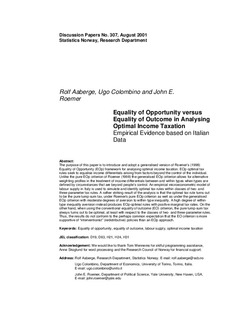| dc.contributor.author | Aaberge, Rolf | |
| dc.contributor.author | Colombino, Ugo | |
| dc.contributor.author | Roemer, John E. | |
| dc.date.accessioned | 2011-11-25T20:23:18Z | |
| dc.date.available | 2011-11-25T20:23:18Z | |
| dc.date.issued | 2001 | |
| dc.identifier.issn | 1892-753x | |
| dc.identifier.uri | http://hdl.handle.net/11250/180563 | |
| dc.description.abstract | Abstract:
The purpose of this paper is to introduce and adopt a generalised version of Roemer's (1998) Equality of Opportunity (EOp) framework for analysing optimal income taxation. EOp optimal tax rules seek to equalise income differentials arising from factors beyond the control of the individual. Unlike the pure EOp criterion of Roemer (1998) the generalised EOp criterion allows for alternative weighting profiles in the treatment of income differentials between and within types when types are defined by circumstances that are beyond people's control. An empirical microeconometric model of labour supply in Italy is used to simulate and identify optimal tax rules within classes of two- and three-parameter tax rules. A rather striking result of the analysis is that the optimal tax rule turns out to be the pure lump-sum tax, under Roemer's pure EOp criterion as well as under the generalised EOp criterion with moderate degrees of aversion to within-type inequality. A high degree of within-type inequality aversion instead produces EOp-optimal rules with positive marginal tax rates. On the other hand, when using the conventional equality of outcome (EO) criterion, the pure lump-sum tax always turns out to be optimal, at least with respect to the classes of two- and three-parameter rules. Thus, the results do not conform to the perhaps common expectation that the EO criterion is more supportive of “interventionist” (redistributive) policies than an EOp approach.
Keywords: Equality of opportunity, equality of outcome, labour supply, optimal income taxation | no_NO |
| dc.language.iso | eng | no_NO |
| dc.publisher | Statistics Norway, Research Department | no_NO |
| dc.relation.ispartofseries | Discussion Papers;No. 307 | |
| dc.subject | Income taxation | no_NO |
| dc.subject | Equality of outcome | no_NO |
| dc.subject | Labour supply | no_NO |
| dc.subject | JEL classification: D19 | no_NO |
| dc.subject | JEL classification: D63 | no_NO |
| dc.subject | JEL classification: H21 | no_NO |
| dc.subject | JEL classification: H24 | no_NO |
| dc.subject | JEL classification: H31 | no_NO |
| dc.title | Equality of opportunity versus equality of outcome in analysing optimal income taxation : empirical evidence based on Italian data | no_NO |
| dc.type | Working paper | no_NO |
| dc.subject.nsi | VDP::Social science: 200::Economics: 210::Economics: 212 | no_NO |
| dc.source.pagenumber | 30 s. | no_NO |
